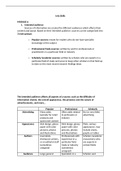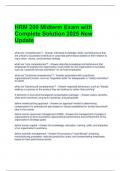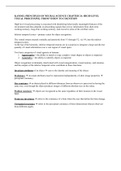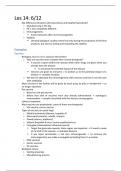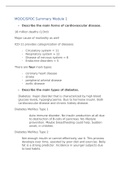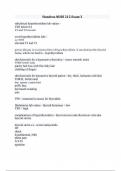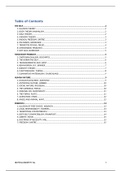Physiological disorders - investigation, treatments and care:
The cause and effect of physiological disorder:
A physiological disease is an illness that interferes with the way that the function of the
body is carried out which can cause severe effects on the body .There are several reason
for the causes of physiological disease for example , there might not be enough or too
much of a certain substance in the body or a pathways might be blocked. Some examples
of physiological disease are diabetes, parkinsons, coronary heart disease, asthma and
many more.
P1: Diabetes is a chronic ( long term ) illness that affects how the body converts food into
energy and affects the endocrine system. The endocrine system is a complex network of
glands and organs which produce and release hormones. Majority of food consumed is
converted to sugar, known as glucose, and then released into the bloodstream. The
pancreas releases insulin when blood sugar levels rise. In order for blood sugar to enter
your body's cells and be used as energy, insulin functions like a key.There are three types
of diabetes : type 1, type 2 and gestational ( some women experience during pregnancy) .
It's estimated that 1 in 11 adults have diabetes. Diabetes can eventually lead to major
health issues like,chronic kidney disease, nerve damage, heart disease and other
problems.
Type 1 diabetes:
Type 1 diabetes also known as diabetes mellitus develops when the pancreas doesn’t
produce insulin causing the level of glucose to rise high. Insulin is a naturally occurring
hormone made by the pancreas that aids the body in using sugar as a source of energy.
Humans need insulin inorder to survive. Due to the lack of insulin in type 1 diabetes blood
glucose level is raised high because of the body’s inability to move the glucose (sugar)
from the blood to the cells in the body where it’s used to provide energy and strength.
P1:Parkinson's disease is a neurological condition that worsens over time. Over time, the
condition has an impact on the brain and causes it to deteriorate.Parkisons affect the
nervous system. The nervous system utilises specialised cells called neurons (also known
as the nerve cell) to receive sensory input from the outside of the body and to transmit
motor commands to the body. Between the muscles, glands, skin, sensory organs, and
brain, these electrical signals are sent. This network of nerves relays messages back and
forth from the brain to different parts of the body inorder for the person to feel sensations
like pain.In the UK, there are approximately 153,000 Parkinson's patients, it is also the
neurological condition that is growing the quickest worldwide.
https://www.parkinsons.org.uk/information-and-support/what-parkinsons
,https://kidshealth.org/en/parents/brain-nervous-system.html#:~:text=The%20nervous%20sy
stem%20 includes%20the,controls%20all%20the%20 body%20 functions.
P1:The precise cause of type 1 diabetes isn’t known but a large number of scientists
believe it has a strong genetic component . Research shows that if an individual biological
mother has type 1 diabetes they have between 1% to 4% risk of developing it and 30% if
both of your biological parents do. Moreover, the causes of type 1 diabetes doesn’t have
links to diet or lifestyle, however some factors that can rise the risk of developing type 1
diabetes are:
● Age - Any age can see the onset of type 1 diabetes, but there are two distinct peaks.
Children between the ages of 4 and 7 experience the first peak. The second affects
kids between the ages of 10 and 14.
● Geography - As you move farther from the equator, the percentage of people with
type 1 diabetes tends to increase.
● Gene - certain type of genes are more likely to develop type 1 diabetes
● Family history
https://www.mayoclinic.org/diseases-conditions/type-1-diabetes/symptoms-causes/syc-203
53011
P1:The loss of dopamine-secreting neurons in the brain is a known cause of Parkinson's
disease, but the precise source of this damage is still unknown. Researchers believe a
combination of genetic changes and environmental factors are the illness's primary cause.
However there are some risk factor that can increase the risk of developing Parkinson
these include :
● Age – one of the biggest risk factors is advancing age, the average age of people
developing parkinsons is 60
● Gender - studies have shown that men are more likely to develop parkinsons than
women
● Genetic - over the past 10 to 15 years there has been a vast amount of research that
links genetic factors and parkisons. An individual with a family member who has
parkisons has approximately two times more risk of developing it. Moreover
parkinsons can run in families because of the defective gene being passed down
from parents.
● Environmental factors - some research shows that environmental factors can trigger
Parkinson's disease. For example exposure to farming chemicals ( like pesticides
and herbicides ), working with heavy metals and detergents all contribute to
developing parkinson .
● Head trauma - repeated exposure to head injuries can increase the risk of
developing parkinsons, but not everyone that gets head trauma develops
parkinsons.
,https://www.hopkinsmedicine.org/health/conditions-and-diseases/parkinsons-disease/parki
nsons-disease-risk-factors-and-causes - accessed 14/09/2023
P1:Signs and symptoms of type 1 diabetes:
Signs are the characteristic detectable by another person through observation.Typical
physical signs you would see in an individual with type 1 diabetes are:unintended weight
loss, itching of genitals, dark urine colour and nausea. The unintended weight loss occurs
due to the individual being dehydrated from frequently urinating and in an effort to make up
for the lack of energy, the body starts to break down fat causing weight loss.The body's
inability to properly store and use glucose from food consumed can also lead to weight
loss. In Addition an individual with type 1 diabetes has a darker urine colour because the
body isn’t able to regulate blood sugar level which can lead to a buildup of ketones in the
body. Symptoms are a feature that an individual will feel and have complaints of.
Symptoms that an individual with type 1 diabetes include: constantly tired or fatigue, mood
swings, excessive thirst, constant urination and blurry vision. Feeling fatigue or tired is
because of the cells not receiving glucose which is needed for energy. Excessive thirst is
experienced because the body tries to flush out excess sugar through constantly urinating
which leads to the body becoming very dehydrated.Constant urination happens because
blood sugar level is high and lungs are working to try and get rid of the excess glucose in
your body. Blurry vision is only temporary but happens because high blood glucose levels
unbalance the fluid in the eye.
https://static1.squarespace.com/static/53b1670ee4b0be242b013ed7/t/543c40c3e4b000867
cb341a2/1413234883138/Type1guide+INSIDE+05.06.09+final.pdf - accessed 14/09/2023
P1: Signs and symptoms of Parkinsons:
The four typical signs you would see in an individual with Parkisons include: speech
change, impaired posture and balance, slow movement and tremors . Individuals with
Parkinson's disease may slur and hesitate when speaking due to the disease affecting the
muscles responsible for articulation and pronunciation . Their speech may sound more
monotone (flat, same level) rather than the normal. Slow movement, also known as
bradykinesia, is a common sign seen in individuals with Parkinson's. It affects different
motor functions such as walking, causing them to move slower and find completing
everyday tasks more difficult and time consuming. Impaired posture and balance is caused
by the disruption of the brain's ability to control and coordinate movement, increasing the
risk of falling and unsteadiness. It can also cause the body to
stay in a stooped position. Tremors are caused due to the loss of dopamine (
neurotransmitter responsible for regulating movement ). They typically occur in a limb such
as the hands when the limb is at rest or relaxed.
https://www.mayoclinic.org/diseases-conditions/parkinsons-disease/symptoms-causes/syc-
20376055Symptoms of parkinson's disease include: loss of smell, nerve pain and sleeping
, problems. Loss of smell also known as anosmia occurs due to the decline of certain parts
of the brain such as the olfaction. The symptom can occur years before the other
symptoms. The exact cause of nerve pain is not yet known but it can be due to the decline
of certain nerve fibres. Individuals with Parkinson's may experience different sleeping
problems such as daytime sleepiness or restless leg syndrome due to all the changes in
the brain .
https://www.nhs.uk/conditions/parkinsons-disease/symptoms/ - accessed 15/09/2023
M1: The impact of body systems and function - diabetes
Diabetes causes several different changes to the body system and functions. One body
system that diabetes changes is the circulatory system. The circulatory system serves as
the body's basic transportation network, allowing blood to travel to and from the cells and
organs while carrying nutrients, hormones, and oxygen. Blood glucose levels can be
controlled by the circulatory system.The hormone glucagon releases glucose into the
blood, and the presence of insulin in the blood tells the cells to absorb glucose from the
blood. Vascular damage may occur if blood glucose levels are too high for an extended
period of time.This can lead to the body's function and health being damaged and increase
the chance of heart attack. https://www.diabetes.co.uk/body/circulatory-system.html
Dk also known as diabetic ketoacidosis develops when the pancreas produces little or no
insulin, so instead the liver breaks down fat into energy. Which causes large amounts of
toxic chemicals (acids and ketones). DK is very serious and some symptoms include
extreme thirst, excessive urination, and fatigue. It can cause unconsciousness or even
death if untreated.
https://www.cdc.gov/diabetes/basics/diabetic-ketoacidosis.html#:~:text=Diabetic%20ketoaci
dosis%20(DKA)%20is%20a,cells%20for%20use%20as%20energy.
Diabetes can damage the tissues which can lead to the individual having low levels of
oxygen, this would impact on how the pancreas functions.As it would mean the pancreas
would need to work more harder due to the fact the body is unable to produce insulin by
itself. Moreover, In type 1 diabetes the immune system, the body's natural defence against
disease and infection ,misinterprets the pancreas beta cell (cell responsible for producing
insulin ) as being dangerous and attacks them, which results in the beta cell dying. The
immediate effects of diabetes included headache, fatigue, increased thirst and frequent
urination. They aren't that serve as the individual will still be able to complete most of the
daily tasks and take care of themselves. However,
diabetes's long term effects include damage to both large and small blood vessels, which
can result in heart attacks and strokes, as well as issues with the kidneys, eyes, feet, and
nerves.This can be very serve due to the fact it can shorten the lifespans and individual will
mostly likely be in care.
The cause and effect of physiological disorder:
A physiological disease is an illness that interferes with the way that the function of the
body is carried out which can cause severe effects on the body .There are several reason
for the causes of physiological disease for example , there might not be enough or too
much of a certain substance in the body or a pathways might be blocked. Some examples
of physiological disease are diabetes, parkinsons, coronary heart disease, asthma and
many more.
P1: Diabetes is a chronic ( long term ) illness that affects how the body converts food into
energy and affects the endocrine system. The endocrine system is a complex network of
glands and organs which produce and release hormones. Majority of food consumed is
converted to sugar, known as glucose, and then released into the bloodstream. The
pancreas releases insulin when blood sugar levels rise. In order for blood sugar to enter
your body's cells and be used as energy, insulin functions like a key.There are three types
of diabetes : type 1, type 2 and gestational ( some women experience during pregnancy) .
It's estimated that 1 in 11 adults have diabetes. Diabetes can eventually lead to major
health issues like,chronic kidney disease, nerve damage, heart disease and other
problems.
Type 1 diabetes:
Type 1 diabetes also known as diabetes mellitus develops when the pancreas doesn’t
produce insulin causing the level of glucose to rise high. Insulin is a naturally occurring
hormone made by the pancreas that aids the body in using sugar as a source of energy.
Humans need insulin inorder to survive. Due to the lack of insulin in type 1 diabetes blood
glucose level is raised high because of the body’s inability to move the glucose (sugar)
from the blood to the cells in the body where it’s used to provide energy and strength.
P1:Parkinson's disease is a neurological condition that worsens over time. Over time, the
condition has an impact on the brain and causes it to deteriorate.Parkisons affect the
nervous system. The nervous system utilises specialised cells called neurons (also known
as the nerve cell) to receive sensory input from the outside of the body and to transmit
motor commands to the body. Between the muscles, glands, skin, sensory organs, and
brain, these electrical signals are sent. This network of nerves relays messages back and
forth from the brain to different parts of the body inorder for the person to feel sensations
like pain.In the UK, there are approximately 153,000 Parkinson's patients, it is also the
neurological condition that is growing the quickest worldwide.
https://www.parkinsons.org.uk/information-and-support/what-parkinsons
,https://kidshealth.org/en/parents/brain-nervous-system.html#:~:text=The%20nervous%20sy
stem%20 includes%20the,controls%20all%20the%20 body%20 functions.
P1:The precise cause of type 1 diabetes isn’t known but a large number of scientists
believe it has a strong genetic component . Research shows that if an individual biological
mother has type 1 diabetes they have between 1% to 4% risk of developing it and 30% if
both of your biological parents do. Moreover, the causes of type 1 diabetes doesn’t have
links to diet or lifestyle, however some factors that can rise the risk of developing type 1
diabetes are:
● Age - Any age can see the onset of type 1 diabetes, but there are two distinct peaks.
Children between the ages of 4 and 7 experience the first peak. The second affects
kids between the ages of 10 and 14.
● Geography - As you move farther from the equator, the percentage of people with
type 1 diabetes tends to increase.
● Gene - certain type of genes are more likely to develop type 1 diabetes
● Family history
https://www.mayoclinic.org/diseases-conditions/type-1-diabetes/symptoms-causes/syc-203
53011
P1:The loss of dopamine-secreting neurons in the brain is a known cause of Parkinson's
disease, but the precise source of this damage is still unknown. Researchers believe a
combination of genetic changes and environmental factors are the illness's primary cause.
However there are some risk factor that can increase the risk of developing Parkinson
these include :
● Age – one of the biggest risk factors is advancing age, the average age of people
developing parkinsons is 60
● Gender - studies have shown that men are more likely to develop parkinsons than
women
● Genetic - over the past 10 to 15 years there has been a vast amount of research that
links genetic factors and parkisons. An individual with a family member who has
parkisons has approximately two times more risk of developing it. Moreover
parkinsons can run in families because of the defective gene being passed down
from parents.
● Environmental factors - some research shows that environmental factors can trigger
Parkinson's disease. For example exposure to farming chemicals ( like pesticides
and herbicides ), working with heavy metals and detergents all contribute to
developing parkinson .
● Head trauma - repeated exposure to head injuries can increase the risk of
developing parkinsons, but not everyone that gets head trauma develops
parkinsons.
,https://www.hopkinsmedicine.org/health/conditions-and-diseases/parkinsons-disease/parki
nsons-disease-risk-factors-and-causes - accessed 14/09/2023
P1:Signs and symptoms of type 1 diabetes:
Signs are the characteristic detectable by another person through observation.Typical
physical signs you would see in an individual with type 1 diabetes are:unintended weight
loss, itching of genitals, dark urine colour and nausea. The unintended weight loss occurs
due to the individual being dehydrated from frequently urinating and in an effort to make up
for the lack of energy, the body starts to break down fat causing weight loss.The body's
inability to properly store and use glucose from food consumed can also lead to weight
loss. In Addition an individual with type 1 diabetes has a darker urine colour because the
body isn’t able to regulate blood sugar level which can lead to a buildup of ketones in the
body. Symptoms are a feature that an individual will feel and have complaints of.
Symptoms that an individual with type 1 diabetes include: constantly tired or fatigue, mood
swings, excessive thirst, constant urination and blurry vision. Feeling fatigue or tired is
because of the cells not receiving glucose which is needed for energy. Excessive thirst is
experienced because the body tries to flush out excess sugar through constantly urinating
which leads to the body becoming very dehydrated.Constant urination happens because
blood sugar level is high and lungs are working to try and get rid of the excess glucose in
your body. Blurry vision is only temporary but happens because high blood glucose levels
unbalance the fluid in the eye.
https://static1.squarespace.com/static/53b1670ee4b0be242b013ed7/t/543c40c3e4b000867
cb341a2/1413234883138/Type1guide+INSIDE+05.06.09+final.pdf - accessed 14/09/2023
P1: Signs and symptoms of Parkinsons:
The four typical signs you would see in an individual with Parkisons include: speech
change, impaired posture and balance, slow movement and tremors . Individuals with
Parkinson's disease may slur and hesitate when speaking due to the disease affecting the
muscles responsible for articulation and pronunciation . Their speech may sound more
monotone (flat, same level) rather than the normal. Slow movement, also known as
bradykinesia, is a common sign seen in individuals with Parkinson's. It affects different
motor functions such as walking, causing them to move slower and find completing
everyday tasks more difficult and time consuming. Impaired posture and balance is caused
by the disruption of the brain's ability to control and coordinate movement, increasing the
risk of falling and unsteadiness. It can also cause the body to
stay in a stooped position. Tremors are caused due to the loss of dopamine (
neurotransmitter responsible for regulating movement ). They typically occur in a limb such
as the hands when the limb is at rest or relaxed.
https://www.mayoclinic.org/diseases-conditions/parkinsons-disease/symptoms-causes/syc-
20376055Symptoms of parkinson's disease include: loss of smell, nerve pain and sleeping
, problems. Loss of smell also known as anosmia occurs due to the decline of certain parts
of the brain such as the olfaction. The symptom can occur years before the other
symptoms. The exact cause of nerve pain is not yet known but it can be due to the decline
of certain nerve fibres. Individuals with Parkinson's may experience different sleeping
problems such as daytime sleepiness or restless leg syndrome due to all the changes in
the brain .
https://www.nhs.uk/conditions/parkinsons-disease/symptoms/ - accessed 15/09/2023
M1: The impact of body systems and function - diabetes
Diabetes causes several different changes to the body system and functions. One body
system that diabetes changes is the circulatory system. The circulatory system serves as
the body's basic transportation network, allowing blood to travel to and from the cells and
organs while carrying nutrients, hormones, and oxygen. Blood glucose levels can be
controlled by the circulatory system.The hormone glucagon releases glucose into the
blood, and the presence of insulin in the blood tells the cells to absorb glucose from the
blood. Vascular damage may occur if blood glucose levels are too high for an extended
period of time.This can lead to the body's function and health being damaged and increase
the chance of heart attack. https://www.diabetes.co.uk/body/circulatory-system.html
Dk also known as diabetic ketoacidosis develops when the pancreas produces little or no
insulin, so instead the liver breaks down fat into energy. Which causes large amounts of
toxic chemicals (acids and ketones). DK is very serious and some symptoms include
extreme thirst, excessive urination, and fatigue. It can cause unconsciousness or even
death if untreated.
https://www.cdc.gov/diabetes/basics/diabetic-ketoacidosis.html#:~:text=Diabetic%20ketoaci
dosis%20(DKA)%20is%20a,cells%20for%20use%20as%20energy.
Diabetes can damage the tissues which can lead to the individual having low levels of
oxygen, this would impact on how the pancreas functions.As it would mean the pancreas
would need to work more harder due to the fact the body is unable to produce insulin by
itself. Moreover, In type 1 diabetes the immune system, the body's natural defence against
disease and infection ,misinterprets the pancreas beta cell (cell responsible for producing
insulin ) as being dangerous and attacks them, which results in the beta cell dying. The
immediate effects of diabetes included headache, fatigue, increased thirst and frequent
urination. They aren't that serve as the individual will still be able to complete most of the
daily tasks and take care of themselves. However,
diabetes's long term effects include damage to both large and small blood vessels, which
can result in heart attacks and strokes, as well as issues with the kidneys, eyes, feet, and
nerves.This can be very serve due to the fact it can shorten the lifespans and individual will
mostly likely be in care.

